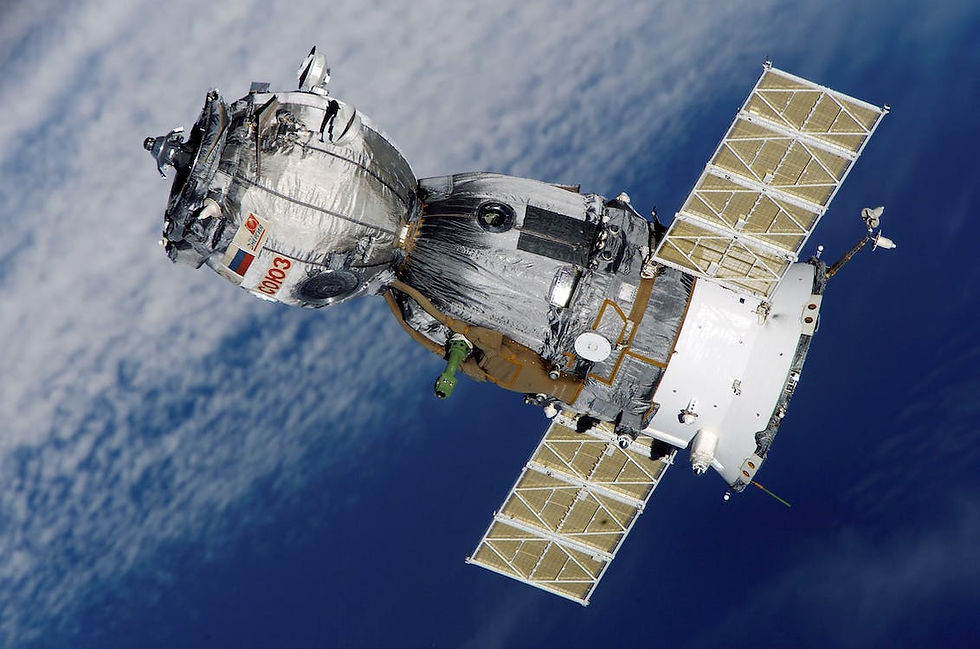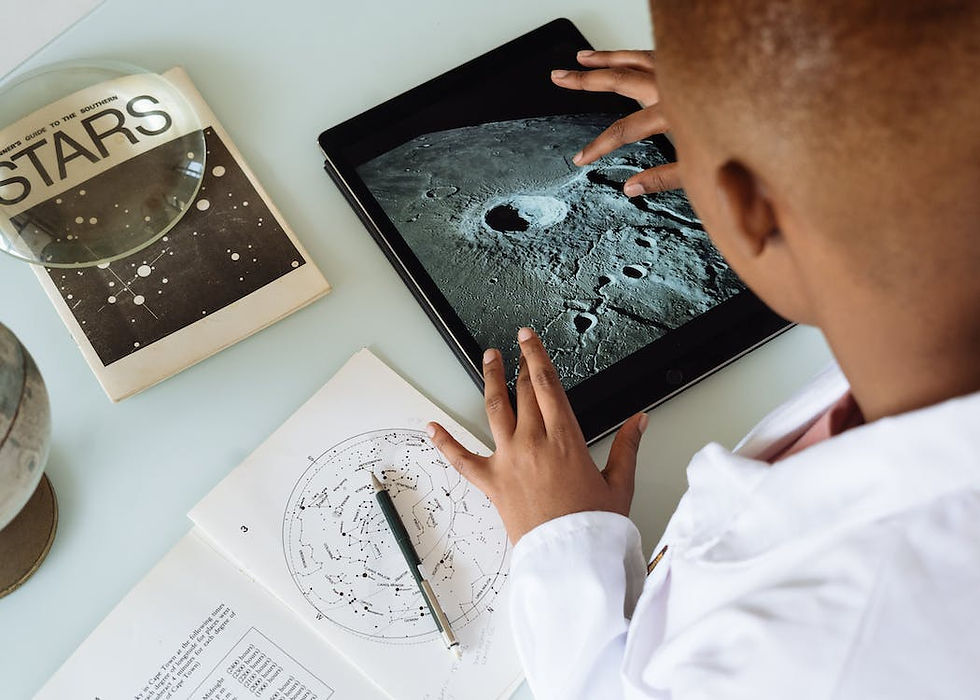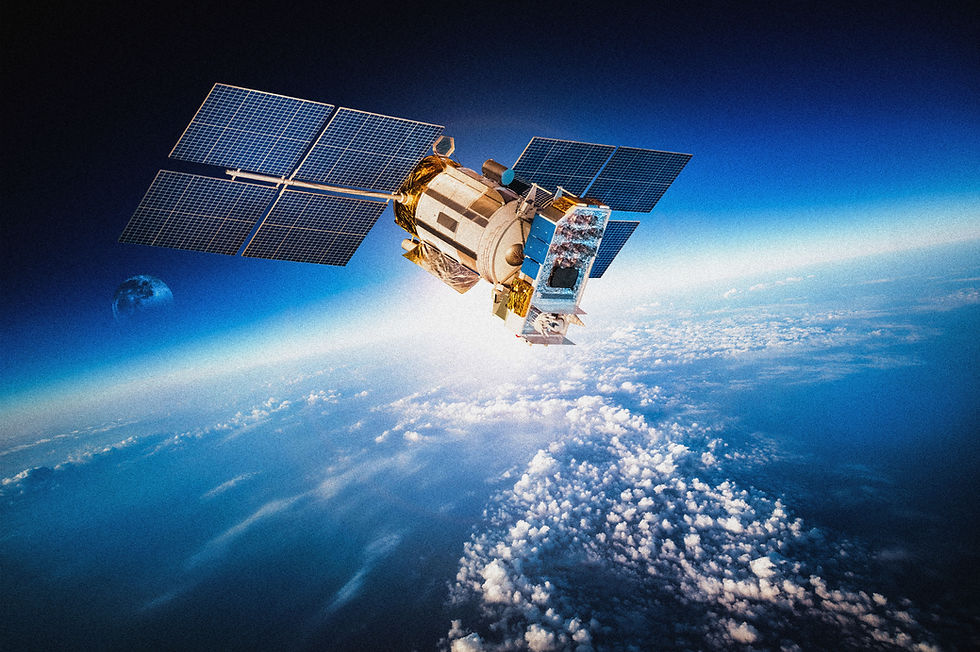The Ethics of Space Exploration.
- The Moolah Team
- Jun 2, 2023
- 11 min read
This blog post will examine the ethical considerations and implications of space exploration, including issues such as space debris, planetary protection, and the potential impact of human activities on other celestial bodies.
We will discuss the various ethical frameworks that can be applied to space exploration, as well as the challenges of balancing scientific exploration with environmental and ethical concerns.
I. Introduction
Space exploration has always been a topic of great interest and fascination for humanity. It represents the pinnacle of human ingenuity and technical prowess. From the first steps taken by Yuri Gagarin and Neil Armstrong to the most recent missions to Mars, our quest to explore the cosmos has been one of our most enduring endeavours. However, as we venture deeper into space, we must also consider the ethical implications of our actions.
Space exploration is not a new field of study. It has been an integral part of our scientific pursuits for many decades. However, the rapid advancements in technology and the increased frequency of space missions have raised new questions and concerns regarding the ethics of space exploration. As we push the boundaries of our knowledge and capabilities, we must also consider the impact of our actions on the universe and the species that inhabit it.
The ethical considerations of space exploration are complex and multifaceted. They encompass a wide range of issues, including space debris, planetary protection, and the impact of human activities on celestial bodies. Each of these issues raises its own set of challenges and requires careful consideration and analysis.
Space debris is a significant concern for space exploration. It refers to the man-made objects that orbit the Earth and other celestial bodies. These objects can include everything from discarded rocket stages and defunct satellites to small fragments of debris. They pose a risk to spacecraft and can cause damage if they collide with other objects in space.
Planetary protection is another important ethical consideration in space exploration. It refers to the measures taken to prevent the contamination of other celestial bodies by Earth-based organisms. This is important because it preserves the scientific integrity of any samples collected from these bodies and ensures that any potential extra-terrestrial life is not contaminated.
Finally, the impact of human activities on celestial bodies is an ethical concern that cannot be ignored. As we explore these bodies, we must consider the potential impact of our activities on their natural environments. This includes everything from the introduction of new materials to the alteration of geological features.
In this blog post, we will explore each of these ethical considerations in depth. We will discuss the challenges posed by space debris, the rationale for planetary protection, and the impact of human activities on celestial bodies. We will also examine the various ethical frameworks that can be applied to space exploration and the challenges of balancing scientific exploration with ethical and environmental concerns.
It is essential that we approach space exploration with a mindset that prioritizes responsible and sustainable exploration. By doing so, we can ensure that our journey into space is not only successful but also ethical and just.

II. Space Debris: A Significant Ethical Challenge
Space debris is one of the most significant ethical challenges of space exploration. It refers to the man-made objects that orbit the Earth and other celestial bodies. The debris can include everything from discarded rocket stages and defunct satellites to small fragments of debris. It poses a significant risk to spacecraft and can cause damage if they collide with other objects in space.
The amount of space debris in orbit around the Earth is a growing concern. According to the European Space Agency, there are approximately 34,000 pieces of debris larger than 10 cm in diameter, and over 128 million pieces of debris smaller than 1 cm in diameter. These objects can travel at speeds of up to 28,000 km/h, making them a significant risk to spacecraft.
The issue of space debris is not only an ethical concern but also a practical one. It poses a significant risk to the safety of spacecraft and astronauts, and it can also interfere with communications and other important space operations. In addition, the accumulation of space debris can limit the number of potential orbits for spacecraft, making it more difficult to plan and execute missions.
The problem of space debris is a complex one that requires a multifaceted solution. One approach is to prevent the creation of new debris by designing spacecraft that are less likely to generate debris when they are in orbit. This includes using materials that are less likely to fragment and designing spacecraft to be more resistant to collisions.
Another approach is to actively remove space debris from orbit. This can be done using a variety of methods, including nets, harpoons, and tethers. These methods are still in development and require further testing and refinement to be effective.
Finally, international cooperation is essential in addressing the issue of space debris. Many countries have space programs and are launching spacecraft into orbit, and each of these programs contributes to the accumulation of space debris. Therefore, it is essential that countries work together to develop and implement strategies for reducing the amount of space debris in orbit.
In conclusion, the issue of space debris is a significant ethical challenge that must be addressed in space exploration. It poses a significant risk to the safety of spacecraft and astronauts and can interfere with important space operations. To address this issue, a multifaceted solution that includes prevention, removal, and international cooperation is required.

III. Planetary Protection: Ethical Considerations for Exploring Other Worlds
Planetary protection refers to the ethical considerations and practices that are necessary when exploring other celestial bodies. The purpose of planetary protection is to prevent contamination of these bodies with terrestrial organisms and to prevent contamination of Earth with extra-terrestrial organisms.
The concept of planetary protection dates back to the early days of space exploration when the first missions were sent to the Moon and other celestial bodies. The concern was that these missions might inadvertently bring back microorganisms from other worlds that could potentially harm Earth's environment and ecosystems.
Today, planetary protection is an essential consideration for any mission that involves landing on or exploring other worlds. The guidelines for planetary protection are established by the Committee on Space Research (COSPAR), an international organization that sets standards and guidelines for space exploration.
There are different levels of planetary protection that are required depending on the mission's objectives and the nature of the target celestial body. The strictest level is Category IV, which applies to missions to Mars and requires that the spacecraft be sterilized before launch and that strict measures be taken to prevent contamination of the Martian environment.
Other planets and moons in our solar system have different levels of planetary protection requirements. For example, missions to Jupiter's icy moon Europa require Category II planetary protection measures, which involve a lower level of sterilization and fewer precautions to prevent contamination of the environment.
Planetary protection is not only an ethical concern but also a scientific one. By preventing contamination of other celestial bodies with terrestrial organisms, scientists can ensure that any life they discover on these bodies is native and not a result of contamination from Earth.
However, planetary protection measures can also be a hindrance to scientific exploration. For example, the strict measures required for a Category IV mission to Mars can significantly increase the cost and complexity of the mission.
In conclusion, planetary protection is an essential consideration for space exploration that requires a balance between ethical concerns and scientific exploration. The guidelines established by COSPAR help to ensure that missions are conducted in a way that prevents contamination of other celestial bodies and Earth. However, these measures can also be a hindrance to scientific exploration and must be carefully balanced with the mission's objectives and feasibility.

IV. The Ethics of Space Debris: A Growing Concern
Space debris refers to the remnants of man-made objects that orbit the Earth or other celestial bodies. This debris includes everything from spent rocket stages and defunct satellites to small fragments of debris that result from collisions and explosions.
Space debris poses a significant risk to space exploration and the safety of spacecraft and astronauts. Even small fragments of debris can cause significant damage to a spacecraft or satellite traveling at high speeds in orbit.
The growing problem of space debris raises ethical considerations for space exploration. The issue of space debris is not only a concern for the safety of current and future space missions but also for the long-term sustainability of space exploration.
One ethical framework for addressing the issue of space debris is the principle of "polluter pays." This principle suggests that those who create the problem should be responsible for cleaning it up. In the case of space debris, this would mean that those who launch objects into space should be responsible for removing them once they are no longer needed.
However, the issue of space debris is complicated by the fact that many of the objects in orbit are no longer under the control of their creators. This means that there is no clear party responsible for removing the debris.
Another ethical consideration is the impact of space debris on other celestial bodies. As we explore other worlds and potentially establish permanent human settlements, the issue of space debris becomes even more critical. Debris from human activities on other worlds could contaminate the environment and harm any native life forms that may exist.
To address the issue of space debris, there have been calls for increased international cooperation and regulation. This includes efforts to develop technologies for removing debris from orbit and guidelines for responsible space exploration.
In conclusion, the growing problem of space debris poses significant ethical considerations for space exploration. The principle of "polluter pays" suggests that those who create the problem should be responsible for cleaning it up, but the issue is complicated by the fact that many objects in orbit are no longer under the control of their creators. The impact of space debris on other celestial bodies also raises concerns for long-term sustainability of space exploration. Addressing these concerns will require increased international cooperation and regulation.

V. Planetary Protection: Ethical Considerations for Exploration Beyond Earth
As we continue to explore the solar system, one of the most significant ethical considerations is the protection of other celestial bodies from contamination by Earth-based life forms. The discipline of planetary protection is devoted to preventing contamination of other worlds by Earth-based organisms and protecting the Earth from any potential contamination brought back by space missions.
One of the primary reasons for planetary protection is the search for extra-terrestrial life. If we were to find life on another world, we would want to be certain that any organisms we discover are native to that world and not the result of contamination from Earth.
Planetary protection also has ethical implications for human exploration of other worlds. If humans were to establish permanent settlements on other planets, we would want to ensure that any organisms we introduce do not harm any native life forms that may exist.
The issue of planetary protection is complicated by the fact that it is not always possible to guarantee the absence of Earth-based organisms on spacecraft or other objects sent to other worlds. Despite rigorous cleaning and sterilization procedures, it is impossible to eliminate all potential sources of contamination.
One ethical framework for addressing the issue of planetary protection is the precautionary principle. This principle suggests that when the potential for harm exists, even in the absence of definitive scientific evidence, action should be taken to prevent harm.
In the case of planetary protection, the precautionary principle suggests that we should err on the side of caution and take steps to prevent contamination of other worlds, even if we cannot be certain that contamination is possible or likely.
Another ethical consideration is the balance between scientific exploration and environmental and ethical concerns. Planetary protection regulations can limit the scope and type of missions that can be undertaken, potentially hindering scientific discovery.
To address these concerns, there have been efforts to develop new technologies and techniques for ensuring the cleanliness of spacecraft and other objects sent to other worlds. Additionally, guidelines and regulations for planetary protection are continually evolving as our understanding of the issue improves.
In conclusion, planetary protection is a critical ethical consideration for space exploration beyond Earth. The search for extra-terrestrial life and the potential impact of human activities on other worlds necessitate careful consideration of the issue. While it is not always possible to eliminate all potential sources of contamination, the precautionary principle suggests that we should err on the side of caution. Efforts to develop new technologies and guidelines for planetary protection will continue to be an important focus of space exploration in the future.

VI. The Impact of Human Activities on Other Celestial Bodies
As humans continue to explore and potentially colonize other celestial bodies, such as the Moon or Mars, there are ethical considerations regarding the impact of human activities on these environments.
One of the most significant concerns is the potential disruption of the natural environment. The Moon and Mars, for example, are relatively pristine environments that have not been altered by human activity. The introduction of human activity and infrastructure could potentially harm the natural environment and ecosystems that exist on these worlds.
Furthermore, the extraction of resources from other celestial bodies raises ethical concerns about ownership and exploitation. Who has the right to extract resources from other worlds? What are the potential consequences of exploiting these resources?
Another ethical consideration is the potential impact of human activities on cultural heritage sites. The Moon and Mars, for example, are home to numerous historical and cultural sites, such as the Apollo landing sites and the Viking 1 lander on Mars. Human activities on these worlds could potentially damage or destroy these sites, leading to the loss of important cultural heritage.
One ethical framework for addressing these issues is the principle of sustainability. This framework suggests that development should meet the needs of the present without compromising the ability of future generations to meet their own needs. In the context of space exploration, this principle suggests that human activities on other celestial bodies should be conducted in a manner that ensures the long-term viability of these environments.
To achieve sustainability, there have been efforts to develop technologies and techniques for minimizing the impact of human activities on other celestial bodies. For example, the Artemis program, which aims to return humans to the Moon by 2024, has emphasized the importance of sustainability and environmental protection.
In conclusion, the impact of human activities on other celestial bodies is an important ethical consideration for space exploration. The potential disruption of natural environments, the extraction of resources, and the impact on cultural heritage sites are all issues that need to be carefully considered. The principle of sustainability provides a framework for addressing these issues and ensuring that human activities on other celestial bodies are conducted in a responsible and ethical manner.

VII. Conclusion
The exploration of space raises a wide range of ethical considerations and challenges. From space debris to planetary protection to the impact of human activities on other celestial bodies, there are many complex issues that need to be carefully considered and addressed.
The ethical frameworks that can be applied to space exploration include utilitarianism, deontology, and virtue ethics. Each of these frameworks offers a different perspective on how to approach ethical considerations in space exploration, and each has its own strengths and weaknesses.
Regardless of the ethical framework that is used, it is clear that space exploration must be conducted in a responsible and ethical manner. This includes minimizing the impact of human activities on the natural environment and cultural heritage sites, ensuring the safety and well-being of astronauts and other personnel, and being mindful of the long-term consequences of our actions.
At the same time, it is important to balance these ethical considerations with the potential benefits of space exploration. Space exploration has the potential to advance scientific knowledge, inspire future generations, and lead to technological advancements that benefit humanity as a whole.
As we continue to explore space and push the boundaries of human knowledge and understanding, it is essential that we do so in a manner that is responsible, ethical, and sustainable. By carefully considering the ethical implications of space exploration and taking steps to address these issues, we can ensure that our exploration of the cosmos is a positive force for good.
Thanks for taking the time to read our in-depth exploration of the ethics of space exploration. We hope this post has provided you with a deeper understanding of the complex ethical considerations and challenges involved in exploring the cosmos.
If you enjoyed this post and want to stay up-to-date on the latest developments in space exploration and other related topics, be sure to subscribe to our newsletter. You'll receive regular updates, exclusive content, and more.
Thanks again for reading, and we hope to see you again soon!
Best regards,
Moolah







Comments